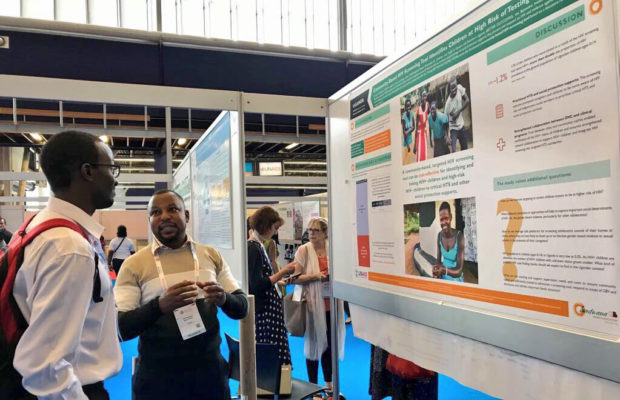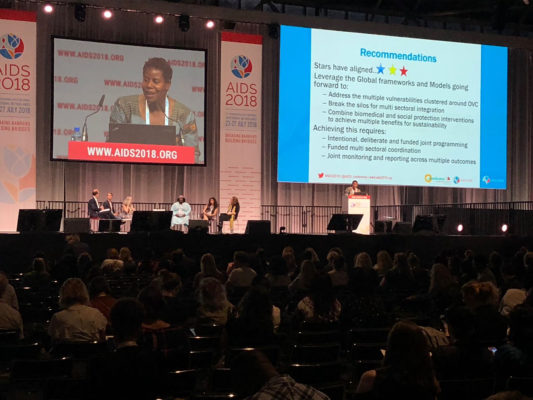The 22nd International AIDS Conference (AIDS 2018)
In July, more than 16,000 researchers, advocates, policy makers, funders and community leaders from over 160 countries gathered in Amsterdam for the 22nd International AIDS Conference (AIDS 2018). Participants contributed to a conference program that included 3,000 abstracts presented from more than 100 countries, along with dozens of satellite sessions, pre-conference programs, demonstrations, performances and community meetings. More than 1/3 of the participants were young people and the conference provided a platform for young people from around the world to network, collaborate and showcase their achievements.
Bantwana remained at the forefront of global discussion with posters and presentations on priority issues including pediatric case finding and evidence-based models of integrated social protection and clinical services across the HIV continuum of care.

Neckvilleus Kamwesigye, Bantwana’s Case Management Specialist under the under PEPFAR/USAID/Uganda BETTER OUTCOMES program, presented a poster on an innovative pediatric case-finding approach. Dr. Rickie Malaba, Health Advisor for Bantwana Zimbabwe’s PEPFAR/USAID Vana Bantwana, presented findings from a retrospective study exploring the relationship between social markers and HIV risk and an evidence-based model to improve pediatric HIV services in rural areas. As part of a pediatric case finding panel hosted by AIDSFree, alongside other globally renowned pediatric HIV experts including Dr. Rashida Ferrand from the LSHTM, Dr. Malaba also presented findings from Bantwana’s combined community/facility approach to increase identification, enrollment and retention of HIV+ children and adolescents using community, school, and urban access points to target, screen, test, and link adolescents to social protection and clinical support.
The presentation sparked rigorous discussion with USAID, PEPFAR, and HIV and OVC colleagues around the way forward for HIV screening, pediatric case finding, and the importance of increasing access to an evidence-based package of social protection and clinical support for HIV infected and highly vulnerable children and caregivers. This point was emphasized throughout the week by globally recognized researchers including Lucie Cluver, Lorraine Sherr, Julie Pulerwitz, whose recent DREAMS and OVC research highlighted the link between GBV, sexual violence and HIV risk and underscored the positive impact of tailored social support packages on HIV prevention and HIV pediatric outcomes, as well as the gaps that remain to reach the UNAIDS 90 90 90 goal by 2020.

We finished the week with a presentation by Patience Ndlovu, Bantwana Zimbabwe Country Director, as part of the UNICEF hosted panel discussion on “Empowering the future generation in a world with HIV needs more than ARVs.” Patience reinforced the importance of building sustainable social protection systems that support HIV outcomes for the long term by addressing the determinants/structural barriers of HIV at the community level for the last mile; building the capacity of community structures to implement multi-sectoral and coordinated HIV services for OVC; use of multiple entry-points to tackle pediatric HIV and leveraging global frameworks to break the silo of multi-sectoral integration by scaling up evidence-based models and differentiated interventions for the care of OVC across the HIV cascade.
She urged the community of donors, policymakers, and all development partners to continue to promote future efforts with Intentional, deliberate and funded joint programming, funding for multi-sectoral coordination and joint monitoring and reporting across multiple outcomes.
